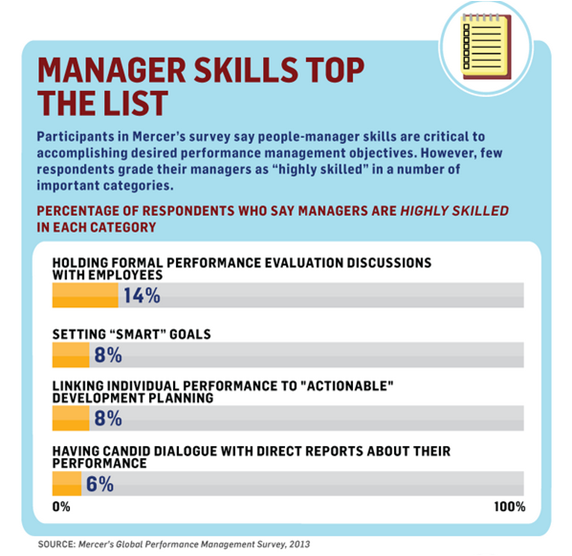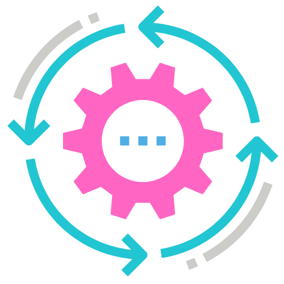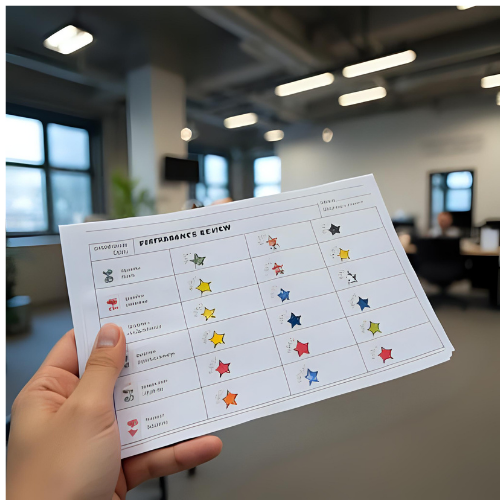Continuous Performance Management Saves the Day
One of the most fundamental parts of a manager’s job is giving timely feedback. When you adopt best practice continuous performance management there's no need to remind managers to give feedback early and often. I'll explain why and how:
If you’re in HR, how many times have you seen this:
A manager shares that an employee’s performance is problematic. The employee needs to be on an exit or performance improvement plan. The first question you ask the manager is something like,
“So, when’s the last time you had a conversation about this issue with the employee?”
Awkward silence.
One of my favorite “feedback” stories is from a colleague. Let’s call her Tanya. On Tanya’s first day of work as head of HR for a medical device manufacturer, this happens:
 Before she’s able to grab a cup of coffee, a senior level manager, let’s call him Jim, bursts into her office. Jim shares that a direct report isn’t performing and needs to go.
Before she’s able to grab a cup of coffee, a senior level manager, let’s call him Jim, bursts into her office. Jim shares that a direct report isn’t performing and needs to go.
After a few questions, Tanya learns:
• Jim hasn’t had a conversation with the employee
• There’s no documentation
• No mention of the issue in the employee’s performance reviews
Tanya shifts the conversation away from the “problem” employee to Jim’s role. Jim admitted he failed to initiate discussions to help course correct the issue. And then Jim has the never to add, “Nonetheless, this guy needs to go.”
Here’s the best part.
Tanya’s response to Jim: “I wonder who here needs to be on the exit plan?”
I don’t advise saying what Tanya did, but she’s just the type of person to get away with such boldness.
But really, how many times do we have to keep repeating the “give feedback early and often” mantra?
 What’s so tricky about giving feedback early and often?
What’s so tricky about giving feedback early and often?
Traditionally, managers learn to provide feedback by describing:
1. The situation (At the meeting yesterday...)2. The observation (when you didn’t have the report ready...)
3. The negative impact (it was a waste of time for those who attended
the meeting and it made you look unprepared.)
This uncomfortable approach leads most people to avoid, water down, or delay essential conversations.
It was only in the last half of my HR career that I managed a team and had to take my own advice. Wow is it difficult to give feedback "early and often"? I couldn't do it.
 When giving "feedback" means calling attention to someone’s shortcomings (s). Most people don’t react like, “Thank you so much for bringing that to my attention.”
When giving "feedback" means calling attention to someone’s shortcomings (s). Most people don’t react like, “Thank you so much for bringing that to my attention.”
At home, at work, and in life the typical reaction, when confronted with a deficiency, is to: defend, deflect, and rationalize.
Research shows that just about 6% of managers are skilled at having candid performance conversations:

The skills to engage in performance conversations don’t come naturally, but they can be learned.
 shouldn't feedback be part of the annual performance review?
shouldn't feedback be part of the annual performance review?
Good question. Short answer...no. Let's see how this works...
If you're in HR you've probably said or heard something like,
“No surprises at performance review time. Anything that’s in the performance review should have been discussed during the year.”
Good advice. But how is this supposed to work when we know that most managers don’t “give feedback early and often”? Help! Traditional performance management coupled with the challenge of early and often feedback needs a rescue!
Continuous Performance Management Saves the Day
Today, continuous performance management, a system of ongoing conversations, has replaced annual performance reviews. You can turn your hope that managers will give feedback early and often into a reality!
The top 10 must-haves for a successful continuous performance management process
-
Small discussions held throughout the year focused on “what’s working now” and how to be more effective moving forward.”
-
Flexibility for people to choose the conversation’s topics and questions.
-
Person-to-person exchanges (Zoom, phone, or live).
-
Higher-level focus on performance, development, career, and the manager/employee work relationship. Transactional topics like tasks, projects, status updates are held separately in 1:1 meetings and during everyday conversations (not a replacement for performance development discussions).
-
Back and forth conversation cadence driven by questions; both the manager and employee contribute equally (unlike the performance review where the manager does the talking).
-
No judgment or evaluation of past performance (focus on the present and near-term).
-
Quick to prepare for and short to hold conversations (5 or 10 minutes of prep and 10-minutes of questions and answers).
-
Just right frequency: the ideal frequency for continuous performance management conversations is monthly (weekly is too frequent, and quarterly convos are too far apart because the longer you wait, the more you’ll be reviewing past information).
It's time to move away from the reminders of "give feedback early and often" and "no surprises" in the annual performance review
It's easy to blame the manager for not doing their job when it comes to withholding feedback. With the right process and support, any manager can engage in the right conversations.
Instead of avoiding essential conversations, managers and employees will engage in dialogue that positively affects relationships, prevents problems from compounding, drives solutions, and even resolves long-standing issues.
Continuous performance management can be the norm throughout your organization.






.png?width=300&height=180&name=Copy%20of%20Copy%20of%20Untitled%20(4).png)